Safe Aluminum Foil Wrapping: A Handbook for Confident Family Care at Home
Safe Aluminum Foil Wrapping: A Handbook for Confident Family Care at Home
Table of Contents
Understanding Aluminum Foil Food Safety
The Science Behind Aluminum Foil Food Safety
Benefits of Aluminum Foil Food Safety
Practical Applications of Aluminum Foil Food Safety
Best Practices for Aluminum Foil Food Safety
Addressing Concerns and Misconceptions about Aluminum Foil Food Safety
Beyond the Kitchen: Other Uses for Aluminum Foil Food Safety
Innovations and the Future of Aluminum Foil Food Safety
1. Understanding Aluminum Foil Food Safety
Aluminum foil, a common household item, plays a surprisingly crucial role in maintaining food safety and quality in our kitchens. Often taken for granted, this thin, versatile sheet of metal is more than just a convenient wrap; it's a barrier, a protector, and a tool in our arsenal against foodborne illnesses and food spoilage. Understanding its properties and proper application is key to maximizing its benefits for the well-being of your family.
What is Aluminum Foil?
Aluminum foil is essentially thin sheets of aluminum, typically less than 0.2 mm thick. It's produced by rolling large slabs of aluminum until they are incredibly thin.
Its unique properties, such as being lightweight, impermeable, non-toxic, and resistant to corrosion, make it ideal for food-related applications.
Why is it Important for Food Safety?
It acts as a barrier against light, oxygen, moisture, and microorganisms, all of which can contribute to food spoilage and contamination.
It helps to maintain consistent temperatures, whether for keeping food warm or cold, which is vital in preventing bacterial growth.
Its ability to seal tightly helps to prevent cross-contamination between different food items, especially in refrigerators.
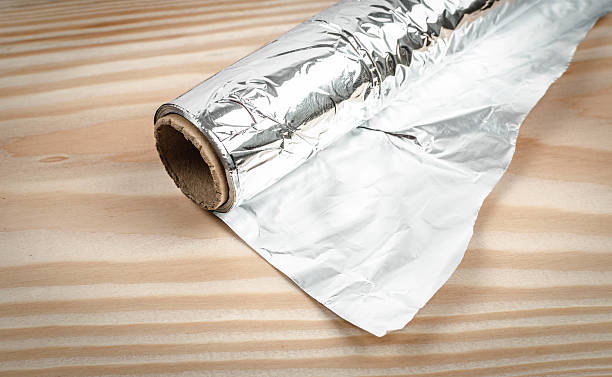
Aluminumn foil
2. The Science Behind Aluminum Foil Food Safety
To truly appreciate the role of aluminum foil, it's helpful to delve into the scientific principles that govern its effectiveness in preserving food and ensuring its safety. Its molecular structure and physical properties are what make it such an effective tool.
Barrier Properties:
Oxygen Barrier: Oxygen is a primary culprit in food spoilage, leading to oxidation, rancidity, and changes in color and flavor. Aluminum foil is virtually impermeable to oxygen, creating an anaerobic environment that slows down these detrimental reactions.
Moisture Barrier: Moisture loss or gain can significantly impact food quality. Foil prevents moisture from escaping, keeping foods from drying out, and also prevents external moisture from entering, which can lead to sogginess or microbial growth.
Light Barrier: Light, especially UV light, can degrade nutrients and accelerate spoilage in many foods, particularly those with high fat content. The opaque nature of aluminum foil blocks out light, protecting sensitive foods.
Thermal Conductivity:
Aluminum is an excellent conductor of heat. This property is beneficial when cooking or reheating food wrapped in foil, as it distributes heat evenly.
Conversely, when used to cover food in the refrigerator or freezer, it helps to maintain a consistent cold temperature, slowing down bacterial proliferation.
Non-Reactivity:
Aluminum foil is largely non-reactive with most foods, meaning it won't impart flavors or harmful chemicals into your meals. While there are some considerations with highly acidic foods (which we'll discuss later), for general use, it's considered safe and inert.
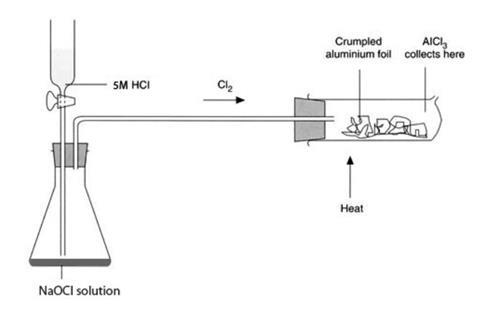
Reactions of chlorine, bromine and iodine with aluminium
3. Benefits of Aluminum Foil Food Safety
The advantages of incorporating aluminum foil into your food handling routines extend beyond simple preservation, touching upon convenience, hygiene, and even economic benefits by reducing food waste.
Extends Shelf Life:
By minimizing exposure to air, light, and moisture, foil significantly slows down the degradation process of many foods, allowing them to stay fresh for longer.
This is particularly useful for leftovers, fresh produce, and baked goods.
Prevents Freezer Burn:
Freezer burn occurs when food comes into contact with cold, dry air, leading to dehydration and changes in texture and flavor. Tightly wrapping food in aluminum foil before freezing creates a barrier that prevents this, preserving quality.
Maintains Food Temperature:
Whether you're keeping warm dishes hot for a potluck or chilling salads for a picnic, foil's thermal properties help to insulate food, maintaining desired temperatures for extended periods.
Reduces Cross-Contamination:
When storing raw meats or strong-smelling foods, wrapping them securely in foil prevents their juices or odors from spreading to other items in the refrigerator, thus reducing the risk of cross-contamination and flavor transfer.
Versatility in Cooking:
Beyond storage, foil is invaluable for cooking. It can be used to tent roasted meats, line baking pans for easy cleanup, or create "foil packets" for steaming vegetables and fish, locking in moisture and flavor.

Benefits of using Aluminumn foil.
4. Practical Applications of Aluminum Foil Food Safety
Now, let's explore specific ways you can leverage aluminum foil in your daily kitchen routines to enhance food safety and convenience.
Food Storage in the Refrigerator and Pantry:
Leftovers: Tightly cover bowls or wrap individual portions of leftovers to keep them fresh and prevent odors from permeating your fridge.
Fresh Produce: Wrap delicate herbs, celery, or half-cut fruits and vegetables in foil to extend their crispness and freshness.
Baked Goods: Use foil to wrap bread, cookies, or cakes to maintain their softness and prevent them from drying out.
Pantry Items: For opened packages of crackers, cereals, or chips, a tight foil wrap can help maintain their crispness and prevent staleness.
Freezing Foods:
Meats and Poultry: Double-wrap raw or cooked meats in foil (and then optionally in a freezer bag) to prevent freezer burn and extend their freezer life.
Batch Cooking: Portion out cooked meals and wrap them individually in foil for easy freezing and reheating.
Baked Goods for Freezing: Wrap individual muffins, cookies, or slices of cake in foil before freezing to maintain their texture and prevent them from absorbing freezer odors.
Cooking and Reheating:
Roasting: Use foil to tent roasted chickens or turkeys to keep them moist and prevent over-browning.
Baking: Line baking sheets with foil for easy cleanup, especially when baking messy items.
Foil Packet Cooking: Create individual foil packets with vegetables, fish, and seasonings for a healthy and flavorful meal cooked on the grill or in the oven. This method steams food, locking in moisture and nutrients.
Reheating Pizza/Leftovers: Wrap slices of pizza or other leftovers in foil before reheating in the oven or toaster oven for a crispier, more evenly heated result than microwave reheating.
Picnics and Potlucks:
Keeping Food Warm/Cold: Wrap hot dishes like casseroles or cold items like salads in foil to help maintain their temperature during transport.
Serving: Use foil to cover platters of food, protecting them from insects and keeping them fresh until serving.
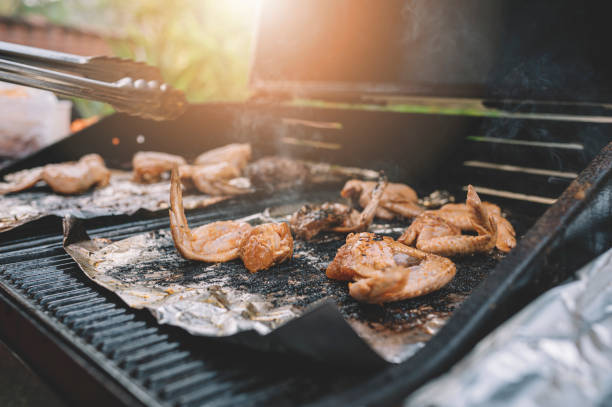
5. Best Practices for Aluminum Foil Food Safety`
While aluminum foil is a valuable tool, using it correctly is essential to maximize its benefits and avoid potential pitfalls. Adhering to best practices ensures optimal food safety.
Choose the Right Type:
Standard vs. Heavy-Duty: Standard foil is suitable for everyday wrapping and light cooking. Heavy-duty foil is thicker and more durable, ideal for grilling, freezing, or wrapping larger, heavier items.
Non-Stick Foil: Available for specific cooking needs, preventing food from sticking.
Ensure a Tight Seal:
The effectiveness of foil as a barrier depends on how tightly it's wrapped. Press out as much air as possible around the food to create an airtight seal.
For bowls, crimp the edges of the foil tightly around the rim.
Avoid Contact with Highly Acidic Foods for Extended Periods:
While generally safe, prolonged contact between aluminum foil and highly acidic foods (like tomatoes, citrus fruits, or vinegar-based sauces) can cause a small amount of aluminum to leach into the food. While the amount is usually negligible and well within safe limits, for very long-term storage or cooking, consider using non-reactive alternatives like glass or ceramic.
Do Not Use in the Microwave (Unless Specified):
Rule of Thumb: No Foil in the Microwave. Aluminum foil is metal and can cause sparking and damage to your microwave oven. There are some specific "microwave-safe" foil containers available, but always check the packaging.
Reuse Responsibly (When Applicable):
If the foil is clean and not heavily soiled with food residue, it can be gently cleaned and reused for non-food contact purposes or even for wrapping food again if it's in good condition. However, for raw meats or highly soiled foil, it's best to dispose of it.
Proper Disposal:
Aluminum foil is recyclable in many areas. Rinse off food residue and ball it up before placing it in your recycling bin. Check with your local recycling facility for specific guidelines.
6. Addressing Concerns and Misconceptions about Aluminum Foil Food Safety
Despite its widespread use, there are sometimes concerns or misunderstandings regarding aluminum foil and its impact on health. Let's address some of these.
Aluminum Leaching into Food:
As mentioned, a very small amount of aluminum can leach into food, particularly acidic foods, when cooked or stored in foil for extended periods.
However, the human body has efficient mechanisms to excrete excess aluminum, and studies generally conclude that the amount ingested from cooking with foil is well below levels considered harmful. The vast majority of our aluminum intake comes from natural sources in food and water.
For those with specific health conditions or who are very concerned, limiting the use of foil with highly acidic foods is an option.
Aluminum and Alzheimer's Disease:
For many years, there was a hypothesized link between aluminum exposure and Alzheimer's disease. However, extensive research by major health organizations (like the Alzheimer's Association and the World Health Organization) has largely debunked this link, concluding that there is no consistent evidence to support a causal relationship.
Foil in Air Fryers:
While some air fryer recipes suggest using foil, it's important to use it judiciously. Ensure the foil does not block airflow, as air fryers rely on circulating hot air for cooking. Also, ensure it is weighted down to prevent it from flying around and potentially touching the heating element.
7. Beyond the Kitchen: Other Uses for Aluminum Foil Food Safety
While our focus has been on food safety, the versatility of aluminum foil extends to numerous other practical uses around the home, some of which indirectly contribute to a safer or cleaner environment.
Cleaning and Scouring:
Ball up a piece of foil and use it as a gentle abrasive to scour pots and pans with stubborn stuck-on food.
It can also be used to clean rust from chrome.
Sharpening Scissors:
Fold a sheet of foil several times and cut through it with dull scissors to help sharpen the blades.
Polishing Silverware:
Line a bowl with foil, add hot water, a tablespoon of baking soda, and the tarnished silverware. The chemical reaction helps to remove tarnish.
Ironing Aid:
Place a sheet of foil under the ironing board cover. The foil reflects heat back to the garment, making ironing more efficient.
Gardening:
Strips of foil can be draped over plants or around garden beds to deter pests.
Crafts and Art Projects:
Foil is a popular material for various craft projects due to its malleability and shiny surface.
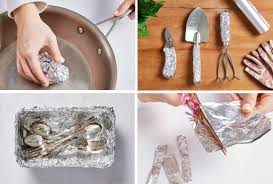
Other uses of aluminumn foil
8. Innovations and the Future of Aluminum Foil Food Safety
The world of food packaging is constantly evolving, and aluminum foil is no exception. Innovations are focusing on enhanced performance, sustainability, and specialized applications.
Improved Coatings and Linings:
Research is ongoing to develop new coatings and linings for aluminum foil that further enhance its barrier properties, prevent sticking, and address any potential interactions with specific foods.
Sustainable Practices:
Efforts are being made to increase the recyclability of aluminum foil and promote the use of recycled content in its production, aligning with broader sustainability goals.
Smart Packaging:
While still in early stages, the concept of "smart packaging" could integrate sensors into foil packaging to monitor food freshness, temperature fluctuations, or even detect bacterial growth, providing real-time information to consumers.
Specialized Foils:
We may see more specialized foils designed for specific cooking methods (e.g., higher heat resistance for certain oven applications) or for preserving particular types of food for even longer durations.
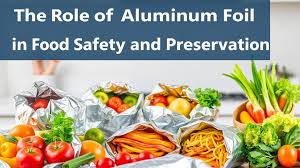
Conclusion
Aluminum foil is a remarkably versatile and effective tool in the pursuit of aluminum foil food safety at home. By acting as a robust barrier against environmental contaminants and maintaining optimal temperatures, it significantly contributes to extending food shelf life, preventing waste, and ensuring that the meals we prepare for our families are safe and delicious. While concerns about aluminum leaching exist, scientific consensus indicates that its proper use poses no significant health risk. Understanding its properties and employing best practices allows us to fully harness its benefits, making it an indispensable part of a well-managed and safe kitchen.
Loc Tu: Pioneering Excellence in Premium Aluminum Packaging Solutions
Why Choose Loc Tu:
✅ Assured Quality & Safety: Crafted from premium, food-grade aluminum, free from harmful impurities, meeting international safety benchmarks.
🔥 Optimal Thermal Properties: Ensures even cooking and excellent heat retention, preserving food temperature and taste effectively.
💪 Durable & Convenient Design: Engineered to resist leaks and dents, providing reliable performance for baking, storage, and transport.
🔄 Versatile Solutions: Our extensive range caters to various applications – from baking and steaming to storing fresh food and takeaway meals.
🌱 Eco-Conscious Packaging: Made from 100% recyclable aluminum, supporting sustainability and reducing plastic waste.
🎯 Brand Enhancement: Optional custom printing available to personalize products and boost your brand visibility.
🚚 Reliable Supply & Delivery: Capable of handling large orders with dependable, on-schedule nationwide shipping.

Your Trusted Partner in Food Packaging 📞
📌 LOC TU MANUFACTURING & TRADING CO., LTD
📌 Website: ALUMINUMFOILVN
📌 HOTLINE/ZALO: +84.969.787.309
📌 Facebook: Khay nhom thuc pham
📌 Youtube: Khay nhom thuc pham Loc Tu
📌 Tik Tok: Khay nhom Loc Tu
📌 Shopee: Khay nhom thuc pham Loc Tu
📌 Telegram: Khay Nhom Thuc Pham Loc Tu
📌 Whatsapp: +84.969.787.309
📌 Branch 1 (Hanoi): No. 1 Pham Tu, Beasky Building, Dai Kim Ward, Hoang Mai District, Hanoi
📌 Branch 2 (Binh Duong): No. 68, DX 051 Street, Group 17, Quarter 4, Phu My Ward, Thu Dau Mot City, Binh Duong Province
📞 Contact us today for expert consultation and the best pricing on premium aluminum trays, foil, and food packaging solutions! 🚀
LOC TU PRODUCTION AND TRADING COMPANY LIMITED
Branch 1 (Binh Duong): No. 68, DX 051 Street, Group 17, Quarter 4, Phu My Ward, Thu Dau Mot City.
Branch 2 (Hanoi): No. 1 Pham Tu, Beasky Building, Dai Kim Ward, Hoang Mai District.
Hotline/Zalo: +84.969787309
Website: Khaynhomthucpham.com
Email: [email protected]